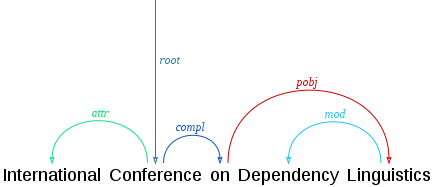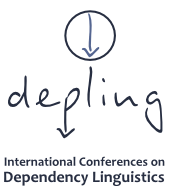

Call for Papers
The Depling conference responds to the growing need for a linguistic conference dedicated to approaches in syntax, semantics and the lexicon that are centered around dependency structures as a central linguistic notion.

In general terms, the conference will investigate:
- The use of dependency structures in the description of interesting syntactic and semantic phenomena, especially in a cross-linguistic perspective, including linguistic phenomena for which classical simple phrase-structure based models have proven to be unsatisfactory.
- The modelling of lexical phenomena and their role in the dependency view of linguistics.
- The applications of dependency analyses to natural language processing, including machine translation, parsing, generation, information extraction, etc.
- The use of dependency trees in syntactic analysis, description, formalization, parsing, generation, and corpus annotation of written and spoken texts.
- The use of semantic valency-based predicate and actancy graph structures and their link to classical logic.
- The elaboration of formal dictionaries for dependency-based syntax and semantics, including descriptions of collocations and paradigmatic links.
- Links to morphology and linearization of dependency structures, using for example topological field theories
- Dependency-like structures beyond the sentence as annotation scheme for discourse phenomena.
- The description and formalization of semantic and pragmatic phenomena related to information structure.
- History, epistemology, and psycholinguistic relevance of dependency grammar, including its relation to generative approaches to language
We are also interested in work on questions such as:
- What are the differences and similarities between theta roles, valencies, f-structures, TAG derivation trees, (subcategorization) frames, semantic role labelling, etc?
- Which corpus annotations using head-daughter relations on words are formally and linguistically equivalent, which are not?
- How to describe syntax-semantic interfaces between dependency structures?
People
Depling 2011 will take place at the Pompeu Fabra University in Barcelona, organized by Leo Wanner (UPF), Lorraine Baqué (UAB), and the teams TALN (UPF) and flexSem (UAB).
The conference is chaired by Eva Hajičová (Charles University in Prague) and Kim Gerdes (Sorbonne Nouvelle, Paris).
Invited speakers: Igor Mel'čuk (University of Montreal) and Joakim Nivre (Uppsala University).
The complete program committee of the Depling 2011 conference
Related Event
The conference Depling 2011 will be held in conjunction with the Fifth International Conference on Meaning-Text Theory to take place immediately after Depling 2011.
Publication
The proceedings will be published as an open access publication. A selection of articles proposing interesting connections of linguistic theories and natural language processing will appear in longer versions at Springer.
Requirements
Papers should describe original work; they should emphasize completed work or in the case of posters ongoing research rather than intended work, and should indicate clearly the state of completion of the reported results. Submissions will be judged on correctness, originality, technical strength, significance and relevance to the conference, and interest to the attendees.
Submissions
The extended deadline for the submission of papers is 11:59pm (Pacific Standard Time (GMT-8)) May 15, 2011. Submission will be electronic in PDF format through the Depling page on EasyChair.
Papers may consist of up to 10 pages of content (including references and figures). All submissions should follow the two-column format and the style guidelines. We strongly recommend the use of the LaTeX style files, OpenDocument or Microsoft Word templates tailored for this year's conference, based on the ACL format.
Reviewing of papers will be double-blind. Therefore, the paper must not include the authors' names and affiliations. Furthermore, self-references that reveal the author's identity, e.g., "We previously showed (Smith, 1991) ...", must be avoided. Instead, use citations such as "Smith (1991) previously showed ...". Papers that do not conform to these requirements will be rejected without review.
Important Dates
- First call for papers: December 2010
- Extended submission deadline: May 15
- Notification of acceptance: June 15
- Camera-ready copy of papers due: July 15
- Depling Conference: September 5-7
